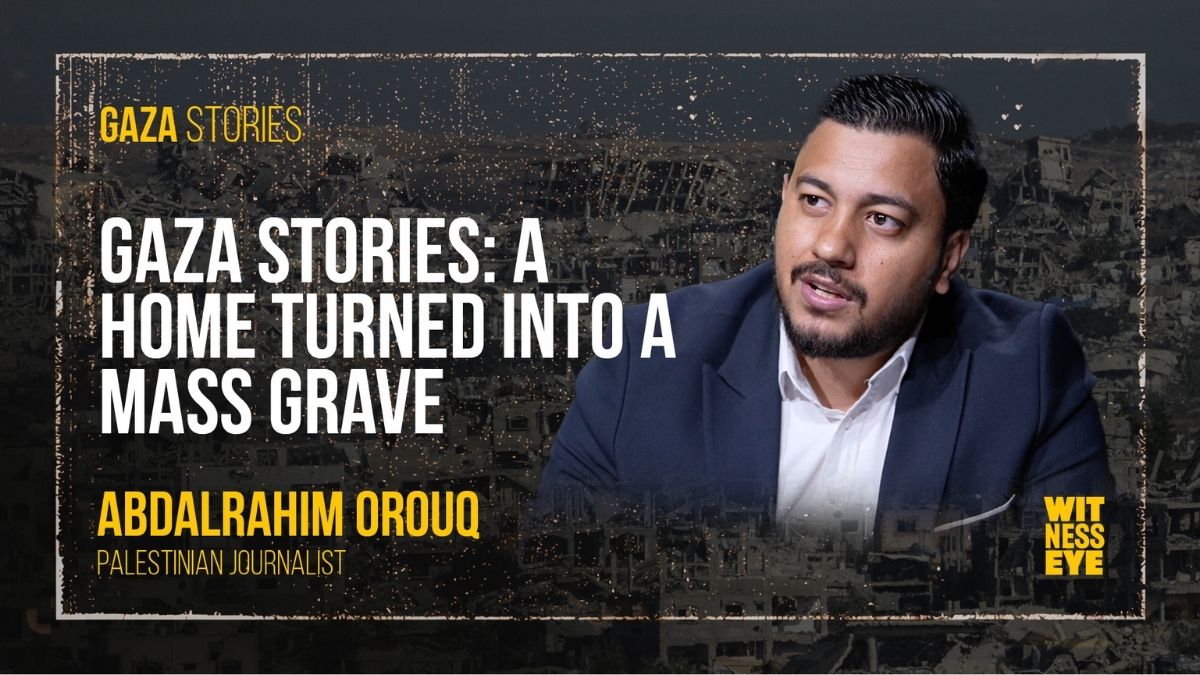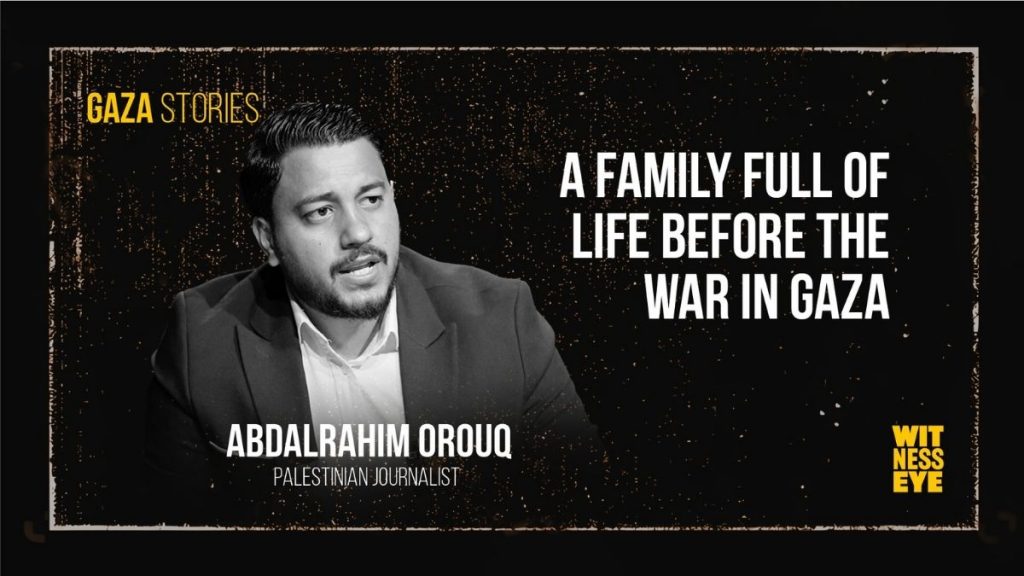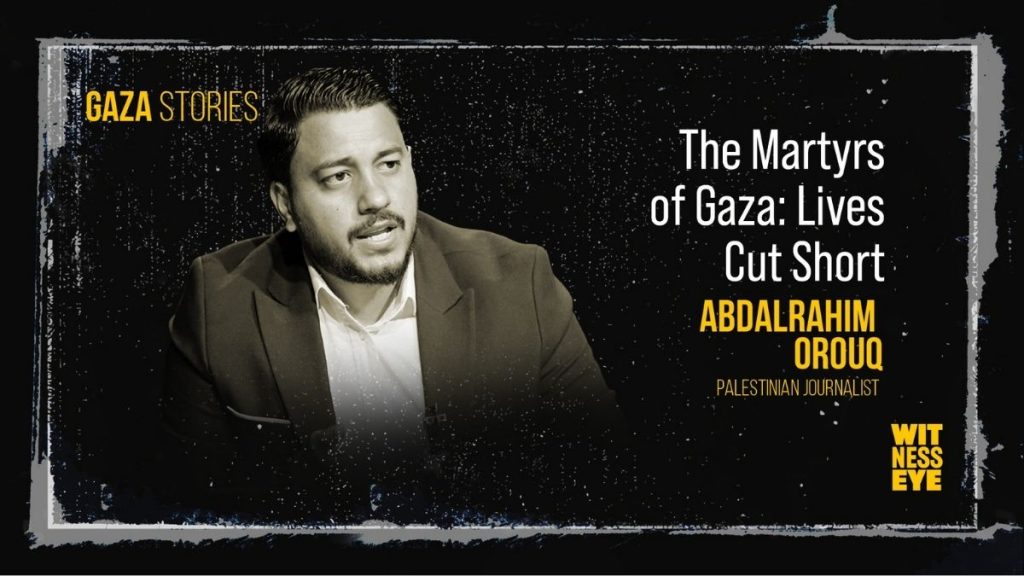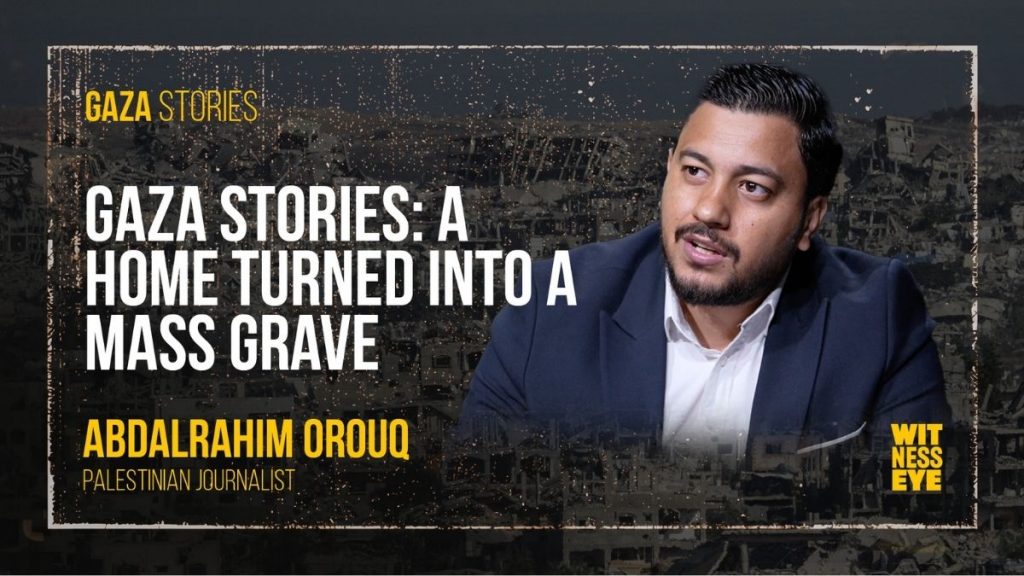
In the crowded streets of Sheikh Radwan, Gaza City, one Palestinian family once lived a life of closeness, warmth, and ritual. The Orouq home was more than walls and a roof — it was a sanctuary where multiple generations gathered daily.
“Our house,” recalls journalist Abd al-Rahim Orouq, “was my father’s life’s dream. He sold my mother’s gold and spent his entire savings to build it. It was the place meant to embrace us all.”
That dream was shattered in the early hours of December 21st, 2023, when an Israeli airstrike leveled the Orouq family home without warning. Twenty-seven members of the family, including children, women, and the elderly, were killed. Abd al-Rahim, living in exile, received the news through fragments of phone calls. “At that moment,” he says, “I felt I wanted nothing but to see my mother, to call out to her. But she was gone.”
This is one of many Gaza Stories — accounts of families erased, lives uprooted, and memories buried beneath rubble.

A Family Full of Life Before the War in Gaza
Before October 7th, Abd al-Rahim’s family lived like many in Gaza: tightly bound, resilient, and deeply social. His parents, six brothers, and two sisters formed the core of an extended family that spanned generations. Meals were sacred moments of gathering. “Even if lunch was cooked in your own home,” he recalls, “you still came to sit with my mother and father. Family rituals were different.”
His late mother, known as Um As’ad, carried a reputation in the neighborhood for her cooking, especially maftoul prepared over wood fire. Even during displacement at the start of the war, she would return to her house despite aching knees and illness, determined to cook for the displaced families sheltering in nearby schools.
“It was this spirit of giving,” Abd al-Rahim explains, “that defined her — even when she had nothing left to give.”
October 7th and the First Days of Horror
When the war began, Abd al-Rahim was abroad, reporting live for television while simultaneously trying to reach his family by phone. “I didn’t leave my phone for a moment, even while on air,” he recalls. But soon, the bombing of telecommunications infrastructure severed contact.
His family faced the impossible choice that tens of thousands of Gazans confronted: stay in their home or flee to overcrowded UNRWA school shelters. For a short time, they tried living in classrooms, enduring hunger, fear, and the absence of toilets. But within days, many returned home, believing no place was safe.
Gaza Stories-December 21st: The Night of Loss
At 2:00 a.m. on December 21st, the Orouq home was struck. The four-story house collapsed on its residents, killing nearly everyone inside. “One hour before,” Abd al-Rahim remembers, “I spoke with them all. We laughed together. Sajida, my niece, promised me, ‘Don’t worry, uncle, we’re old enough.’ That was our last conversation.”
Among the martyrs were his brothers As’ad, Rizq, and Ahmed, along with their wives and children. His mother, who had gathered with them for evening prayers, was also martyred.
The family had also taken in displaced neighbors days before. “My brother As’ad,” Abd al-Rahim recalls, “gave half the house to them, saying they needed shelter more than we did. That was who he was — he preferred others over himself.”

The Martyrs of Gaza: Lives Cut Short
Each sibling carried dreams and legacies now lost:
-
As’ad, the eldest, who left school early to work but later studied alongside his son, determined to complete his education.
-
Rizq, a journalist and Abd al-Rahim’s role model, who inspired him to pursue media.
-
Ahmed, the youngest, a computer engineer who returned from Turkey to marry under his mother’s gaze.
“Every one of them was a story, a dream, a narrative,” Abd al-Rahim says. “Now they are memories buried in rubble.”
For eleven days, Abd al-Rahim did not know who among his family had survived. Rumors reached him from neighbors, some saying his mother was alive, others reporting executions carried out by soldiers in the area. The truth came only when Israeli forces withdrew, allowing neighbors to search the ruins.
“They buried my mother several times,” he recalls painfully. “The bodies were burned, unrecognizable. But I knew her leg from the cracks in her skin. I used to massage her feet. I told them, ‘This is my mother’s body.’”
Even now, some of his relatives — including his brother As’ad and nephew Bahaa, who was engaged and preparing for his wedding — remain under the rubble.
A Child Survivor Killed by Aid
Two months after the bombing, tragedy struck again. Zain, Abd al-Rahim’s young nephew who had survived the December attack, became a symbol of Gaza’s resilience when he appeared in a viral video, laughing as he carried an aid box.
But one day, as planes dropped food packages without parachutes, a heavy box struck Zain’s thin frame. Severely injured, he died in hospital. “His last words,” Abd al-Rahim says, “were to his father: ‘Dad, it hurts. I don’t want to die.’” This cruel twist of fate — a child surviving war crimes only to die from chaotic aid drops — deepened the family’s wounds.
From exile, Abd al-Rahim struggles daily with grief. “At first, I couldn’t tell their story. It was too much. Talking about it felt like exploiting their martyrdom. But then I remembered Sajida’s words to me:
‘Uncle, don’t forget to tell people about us.’ That’s why I speak now.”
He emphasizes that his family were civilians, not fighters. “The occupation drags us into justifying the obvious,” he says. “My family were ordinary people. They loved, they worked, they dreamed. And they were killed only because they were Palestinian.”
Gaza Stories-Bearing Witness
The story of the Orouq family is not isolated. It echoes across Gaza — stories of families wiped out, children buried, and neighborhoods erased. Documentation efforts, such as Eyewitness Testimonies and Civilian Casualty Mapping, seek to preserve these truths against denial and erasure. For Abd al-Rahim, memory itself is resistance. “Every name, every face, every laugh I recall — it is proof they lived. And proof they were taken unjustly.”
The annihilation of Abd al-Rahim Orouq’s family in Sheikh Radwan is one among countless Gaza Stories. It is a story of dreams interrupted, love destroyed, and the resilience of memory in the face of genocide. As Abd al-Rahim insists: “Numbers don’t matter. What matters is that Um As’ad, As’ad, Rizq, Ahmed, their wives, their children — they all had stories. And now, it’s our duty to tell them.”
Hear the testimony of Abd al-Rahim Orouq in his own words—a witness to war, exile, and resistance, carrying Gaza’s pain and the call for justice.
Stay Connected with Witness Eye
Follow us on our official channels:

